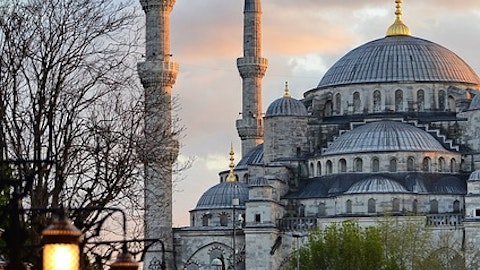In this article, we discuss top 20 smart cities in the world. You can skip our detailed analysis of smart cities technology and its future, and go directly to read Top 5 Smart Cities in the World.
The technological advancements in today’s world leave almost everyone amazed. The transformation the world has undergone in the last two decades highlights the increasing significance of technology in shaping our future. Each day, we step into a new world filled with groundbreaking discoveries that captivate the entire globe. One such phenomenon is the concept of ‘smart cities’, which revolves around the integration of advanced technologies and data-driven solutions to improve the overall quality of life for residents and enhance the efficiency of urban services and infrastructure.
According to the United Nations, around 70% of the world’s population will reside in urban areas by 2050 (see 20 Largest Economies by 2050). As a result, emissions and energy consumption will continue to increase. To address these challenges, smarter urban solutions are necessary. This is where smart city programs and initiatives play a crucial role. By integrating smart technologies into urban areas, the quality of life for residents can be enhanced, and public safety can be improved.
Although the concept of smart cities is still in its early stages, it is rapidly gaining momentum worldwide. Bloomberg reported Grand View Research’s data and highlighted that the global smart cities market was valued at roughly $1.1 trillion in 2021 and is projected to grow significantly to $6.9 trillion by 2030, with a compound annual growth rate (CAGR) of 24.2% between 2022 and 2030.
Various studies have highlighted that by integrating advanced technologies and data-driven solutions, smart cities can tackle urban challenges in a more efficient and effective manner. According to a report by McKinsey Global Institution published in 2018, digital applications have the potential to address practical and human concerns in cities. The report highlights that smart technologies can lead to significant improvements in key quality-of-life indicators, ranging from 10 to 30 percent. These improvements translate into saved lives, reduced crime incidents, shorter commutes, improved health outcomes, and lower carbon emissions.
Smart city projects often require significant investments in advanced technologies, infrastructure, and expertise. For this reason, leading companies in the US are actively involved in launching smart city initiatives. Accenture plc (NYSE:ACN) and International Business Machines Corporation (NYSE:IBM) were among the pioneers, starting their work on the concept in 2009. IBM organized nearly 100 Smarter Cities Forums globally in 2009. The company initiated the Smarter Planet University jam to provide students with access to technology and training for acquiring new skills and supporting city projects worldwide. Moreover, from 2010 through 2017, IBM sent 800 top experts to assist over 130 cities through the Smarter Cities Challenge.
Similarly, Microsoft Corporation (NASDAQ:MSFT)’s CityNext is a global initiative that aims to empower cities with intelligent solutions to address urban challenges and improve the quality of life for citizens. Through this program, Microsoft offers a wide range of solutions, including smart energy management, traffic optimization, public safety enhancements, citizen engagement platforms, and smart infrastructure monitoring. The company also took part in the 2021 Smart City Expo & World Congress, an event that focused on urban innovation.
As the benefits of smart cities become increasingly apparent, governments and private entities worldwide are investing significant resources in research, pilot projects, and large-scale implementations. The Indian government has allocated Rs 16,000 crore for its Smart Cities Mission. Additionally, they have introduced an urban infrastructure development fund for smaller towns and proposed reforms in urban planning and property tax to enhance sustainability. Considering the growing popularity of smart cities around the world, we have compiled a list of the top 20 smart cities in the world.

Our Methodology:
For this list, we used the IMD Smart City Index 2023, which is a survey that evaluates the perceptions of residents from 141 cities worldwide. It ranks these cities based on their infrastructure and technology services. The final score is calculated using perceptions from the last three years, with different weights assigned to each year.
The survey focuses on two main aspects: Structures, which assesses existing infrastructure, and Technology, which evaluates technological provisions. Each aspect is further examined in five key areas: health and safety, mobility, activities, opportunities, and governance. The cities are grouped based on their Human Development Index (HDI) score, and within each group, they are assigned a ‘rating scale’ (AAA to D) based on their perceptions score relative to other cities in the same group.
20. Munich
Munich is the capital and the largest city of the German state Bavaria. The city recently started implementing a smart city framework strategy, incorporating advanced technologies into new developments to create a smarter and more connected urban environment. As a part of its Smarter Together project, Munich is transforming the Neuaubing-Westkreuz/Freiham district, which is currently home to around 30,000 people, into a smart and futuristic neighborhood.
The Smart City project is working to promote e-mobility, installing smart and energy-efficient street lighting, refurbishing houses to lower energy consumption and move towards 100% renewable energy, and introducing a SmartCity app that connects various services intelligently. Additionally, they are setting up a smart urban data platform as the foundational technology to support all these smart city measures.
19. Hong Kong
Hong Kong is next on our list of the top 20 smart cities in the world. In 2017, Hong Kong launched a Smart City Blueprint, pledging over HK$900 million (approximately US$116 million) to develop digital infrastructure and smart city initiatives. Some of these strategies include the “iAM Smart” program and Covid-19 tracing apps, which have demonstrated how smart city concepts can be integrated into people’s everyday lives. In addition to this, Hong Kong’s Science and Technology Parks Corporation and Cyberport offer valuable assistance to digital entrepreneurs, providing funding and incubation support.
18. Sydney
Sydney is the capital of New South Wales and is one of the largest cities in Australia. Its Smart City Strategic Framework serves as a guiding approach for effectively utilizing technology and data to make informed decisions and improve the overall quality of life for our diverse communities. It is one of the top 20 smart cities in the world.
It is projected that by the year 2030, around 25%-46% of the current workplace activities in Australia could be automated. This automation is expected to contribute significantly to the national economy, generating an approximate boost of $1.2 trillion. By increasing productivity through automation, there is potential for inclusive income growth, and it is estimated that each Australian could see an additional $4,000 in their annual income.
17. Dubai
Dubai is next on our list of the top 20 smart cities in the world. The primary objective of Dubai’s Smart City is to enhance connectivity and foster stronger collaboration between the city or emirate and its residents. It aims to achieve this by encouraging the widespread adoption of smart applications to access various government facilities and services, making daily interactions with the city more efficient and convenient for its inhabitants.
16. Seoul
Seoul is the capital city of South Korea. It is the largest city in the country and serves as its political, cultural, and economic center. Seoul has been honored with the title of Smart City of 2022 at the World Smart City Awards, an annual recognition presented by the Smart City Expo World Congress (SCEWC). These awards acknowledge exceptional initiatives and projects within the innovation and urban transformation sector.
Seoul is considered a smart city due to its extensive use of advanced technologies and innovative initiatives aimed at enhancing urban living and efficiency. The online reporting of city maintenance issues offers a quick and efficient solution to address problems promptly. The availability of free public WiFi has enhanced access to city services for residents and the presence of CCTV cameras has contributed to an increased sense of safety among residents. Moreover, a website or app enables residents to effectively monitor air pollution levels in the city.
15. Amsterdam
Amsterdam is one of the most high-tech cities in the world. The city serves as a leading model for smart cities worldwide by effectively integrating cutting-edge solutions, promoting collaboration among stakeholders, and placing a strong emphasis on citizen engagement. Through these efforts, Amsterdam demonstrates how a city can leverage technology and innovation to create a more sustainable, efficient, and livable urban environment.
The Amsterdam Smart City Project is leading the way in the energy revolution with its innovative use of smart grids. These grids enable efficient distribution, consumption, and production of energy throughout the city.
14. Prague
Prague is next on our list of the top 20 smart cities in the world. Some projects from the Smart Prague concept include the Prague Data platform, which allows city apps and data to connect seamlessly and handle large volumes of data. It also addresses neglected data that was previously limited by technical or legal constraints. In addition to this, implementation has started on some other projects, such as an intermodal route planner and intelligent traffic analysis.
13. Abu Dhabi
Abu Dhabi is next on our list of the top smart cities in the world. Over the years, Abu Dhabi has become a smart and sustainable city by adopting advanced technologies like artificial intelligence and the Internet of Things (IoT). The city has implemented smart city projects in different areas, including public services and transportation. These initiatives have allowed Abu Dhabi to create a modern and eco-friendly urban environment.
12. Beijing
Beijing, the capital of China, stands out as a prime example of a smart city, leveraging cutting-edge technologies to enhance urban living and sustainability. Beijing’s Citizen Social Service Card is one of its most popular smart city initiatives. The digital card stores essential information like identification documents and health conditions. Being a cashless city, Beijing residents can conveniently use their smartphones to pay for various services, including public transport and goods.
11. Hamburg
Hamburg is located in northern Germany. It is one of the country’s major port cities, serving as a significant economic and cultural hub in the region. Hamburg’s Smart City Approach is evident in its daily life with the integration of smart technologies, innovative pilot projects, and modern architecture shaping the city’s progress. The city’s success is driven by a growing economy with abundant job opportunities and a wide array of educational institutions.
10. Stockholm
Stockholm is next on our list of the top smart cities in the world. Stockholm has developed a strategy to become a smart and connected city through collaboration with its employees, residents, businesses, and academic institutions. This strategy was officially adopted by the Stockholm City Council in 2017. The aim is to use advanced technologies and data-driven solutions to improve urban living, sustainability, and efficiency in various areas.
In addition to this, Stockholm’s fiber-optic infrastructure is continuously playing a crucial role in enhancing the city’s appeal to businesses, especially in the technology sector. The availability of high-speed and reliable internet connectivity through fiber optics has become a significant advantage for companies operating in Stockholm.
9. Geneva
Geneva is located in the western part of Switzerland. Geneva’s smart city vision, Smart Geneva, serves as a hub for innovation, aiming to create a network of dedicated individuals and organizations committed to driving innovative initiatives for the Grand Genève area. The focus is on engaging the community to bring about positive changes that align with the region’s unique characteristics and needs.
8. Helsinki
The Helsinki Smart Region is a Finnish innovation center with a focus on three main areas: creating a city that revolves around its citizens, exploring climate-friendly solutions, and promoting industrial technologies. Through its digital inclusion initiative, citizens have access to a wide range of information, including health statistics and 3D models of buildings. This data empowers cities to develop more inclusive and tailored services for their residents.
In addition to this, Helsinki Smart Region is also exploring smart strategies like promoting AI, climate neutrality, and smart mobility.
7. Singapore
Singapore ranks seventh on our list of the top 20 smart cities in the world. The Smart Nation initiative of Singapore was initiated by Prime Minister Lee Hsien Loong in 2014. Through 2017, the government provided a substantial injection of $1.73 billion to support the program. As a result, Singapore has successfully implemented a diverse range of smart technologies in both its public and private sectors.
In 2016, nuTonomy, which was later acquired bY, Aptiv PLC (NYSE:APTV), made history in Singapore by introducing the first “robot taxis,” marking the beginning of autonomous vehicle testing in the country. Although the initial trial was modest, with only six vehicles operating in a 2.5-square-mile area, it served as a groundbreaking milestone, paving the way for other companies to conduct their autonomous taxi trials in the region. Another German aerospace company, Volocopter GmbH announced that Singapore is poised to become the location for the world’s first electric-powered air taxi service by the end of 2023.
6. London
London is home to some of the major multinational companies such as Shell plc (NYSE:SHEL), Unilever PLC (NYSE:UL), and British American Tobacco p.l.c. (NYSE:BTI).
In 2018, London’s Mayor, Sadiq Khan, launched the Smarter London Together Roadmap to enhance the city’s smart capabilities. This roadmap proposed ideas for city-wide cooperation, utilizing valuable data, enhancing digital infrastructure, and fostering local talent and innovation in all 32 boroughs of the city.
London has established itself as a leader in smart and sustainable infrastructure in Europe. The city boasts more 5G towers, electric vehicle (EV) charging stations, and green infrastructure than most European cities. Its dedication to green-certified buildings and publicly accessible EV charging points further demonstrates its commitment to building a greener and more sustainable urban environment.
Click to continue reading and see Top 5 Smart Cities in the World.
Suggested articles:
Disclosure. None. Top 20 Smart Cities in the World is originally published in Insider Monkey.




